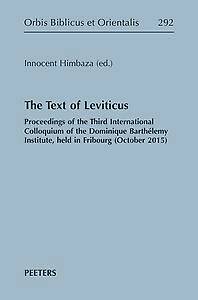
Bedankt voor het vertrouwen het afgelopen jaar! Om jou te bedanken bieden we GRATIS verzending (in België) aan op alles gedurende de hele maand januari.
- Afhalen na 1 uur in een winkel met voorraad
- In januari gratis thuislevering in België
- Ruim aanbod met 7 miljoen producten
Bedankt voor het vertrouwen het afgelopen jaar! Om jou te bedanken bieden we GRATIS verzending (in België) aan op alles gedurende de hele maand januari.
- Afhalen na 1 uur in een winkel met voorraad
- In januari gratis thuislevering in België
- Ruim aanbod met 7 miljoen producten
Zoeken
The Text of Leviticus
Proceedings of the Third International Colloquium of the Dominique Barthelemy Institute, Held in Fribourg (October 2015)
€ 169,45
+ 338 punten
Omschrijving
The book of Leviticus is by far the most quoted in rabbinic literature such as the Mishna or the Talmud, while it has been marginalized in the Christian tradition. Nevertheless, scholars of both traditions have again become highly interested in it for some decades now. As shown by many recent publications, the book is thoroughly studied for textual, literary, historical and reception aspects. It has often been said and written that the text of Leviticus is stable in comparison to many other books of the Hebrew Bible, and that its Greek translation is quite literal. Yet, the text of Leviticus continues to raise questions, not only regarding its content and textual witnesses, but also its interpretation, history and reception. The third international colloquium of the Dominique Barthelemy Institute, held in Fribourg in October 2015, aimed to bring together some specialists of the text of Leviticus in order to advance research on its textual witnesses and the aforementioned topics. The articles collected in this book reflect the width of current research. They deal with the witnesses to the text of Leviticus in the Dead Sea Scrolls, the Masoretic Text, the Samaritan Pentateuch and the Septuagint. They also study the book's Hebrew editing; its relation to other books such as Joshua, Luke-Acts and Flavius Josephus; and the challenge of its translation, with a case study in French. Le livre du Levitique est de loin le plus cite dans la litterature juive, notamment la Mishna ou le Talmud, alors qu'il a ete marginalise dans la tradition chretienne. Neanmoins, depuis quelques decennies, les chercheurs des deux bords se sont interesses a ce livre. De nombreuses publications recentes montrent qu'il est etudie dans tous ses aspects textuels, litteraires, historique et dans sa reception. On a souvent affirme que le texte du Levitique est plus stable que celui de beaucoup d'autres livres de la Bible hebraique, que sa traduction grecque est litterale, etc. Pourtant, ce texte continue de soulever des questions, non seulement en ce qui concerne ses temoins textuels, mais aussi son interpretation, son histoire et sa reception. Tenu a Fribourg en Octobre 2015, le troisieme colloque international de l'Institut Dominique Barthelemy entendait rassembler quelques specialistes du texte du Levitique pour avancer dans la recherche sur ces differents sujets. Les etudes rassemblees dans ce volume refletent le vaste champ de recherche sur ce livre biblique. Elles touchent a la maniere dont le Levitique apparaOEt dans les temoins textuels, notamment les manuscrits de la Mer Morte, le Texte Massoretique, le Pentateuque Samaritain et la Septante. Elles abordent egalement les defis de son edition hebraique, ses relations avec d'autres livres comme Josue, Luc-Actes et Flavius Josephe et enfin les enjeux de sa traduction francaise.
Specificaties
Betrokkenen
- Uitgeverij:
Inhoud
- Aantal bladzijden:
- 290
- Taal:
- Engels
- Reeks:
- Reeksnummer:
- nr. 292
Eigenschappen
- Productcode (EAN):
- 9789042943445
- Verschijningsdatum:
- 25/09/2020
- Uitvoering:
- Hardcover
- Formaat:
- Genaaid
- Gewicht:
- 576 g

Alleen bij Standaard Boekhandel
+ 338 punten op je klantenkaart van Standaard Boekhandel
Beoordelingen
We publiceren alleen reviews die voldoen aan de voorwaarden voor reviews. Bekijk onze voorwaarden voor reviews.








